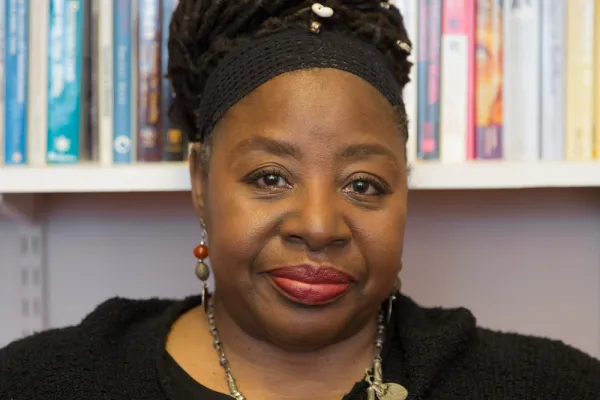Activist Loretta Ross: Staying Hopeful
Research & Inquiry

Published September 18, 2019
On the door to her office in Wright Hall, Loretta Ross—activist, author and, this year, a visiting associate professor in the Program for the Study of Women and Gender—has posted an image of a woman leaping in the air above a banner that asserts, “We Were Made for These Times.”
The current times are the focus of Ross’ writing, teaching and speaking—new areas of activity for her after nearly five decades of frontline organizing.
The course she is teaching this fall at Smith, “White Supremacy in the Age of Trump,” drew a waiting list of students—as well as people from the broader community interested in the urgency of the topic.
A former activist-in-residence at Smith, Ross is also completing a book about how the digital era’s “call-out culture,” where people publicly critique each other’s beliefs, affects social justice organizing. She is offering two “Calling Out and Calling In” workshops for campus community members: Wednesday, Sept. 25 at 4:30 p.m., and Wednesday, Oct. 2, at 4:30 p.m., both in McConnell B15.
Here’s what Ross had to say about her work at Smith.
What inspired you to want to teach a course about white supremacy and President Donald Trump?
“In the 1990s, my job was with a black-led organization [the National Anti-Klan Network] that was monitoring hate groups. That gives me expertise in how these white supremacist movements operate. As the storm clouds were gathering around Trump’s election, I felt like Chicken Little, talking about the things that had been there a long time, but people were ignoring. When Hampshire College was looking for someone to teach a course on civil liberties [in 2017], I realized I wanted to teach about white supremacy at this particular historical moment. I am grateful to President Kathleen McCartney for reaching out to me to teach the course.
Is it hard for students to talk about the racial issues you explore in class?
“The subject is hard. And I don’t use any trigger warnings. The speaking guidelines I give out are probably the most challenging part for students who are used to talking about their feelings. How you feel is not the point of the class; we need to be talking about structural issues. I like to say, ‘We need less me-search and more research.’ I do try to make the class fun, because I believe all learning should be fun.”
How do you do that in a class about white supremacy?
“We tell stories and watch videos….I’m an activist, so I’m teaching people about what resistance looks like, how to have fun doing it, and how to do it for the long haul. It’s important not to take yourself too seriously, because social justice is a big experiment. My mom told me when I was struggling in college, ‘Loretta, you don’t let success go to your head, but you also don’t let failure go to your heart.’ That’s part of what I teach.”
Do you see any positives in our current political moment?
“Many people are waking up to how fragile our democracy is—that’s what Trump is really calling the question on. A lot more white people are now aligning on the side of the angels and resisting because it’s in their own self-interest.”
How do you advise people interested in social justice to deal with people they disagree with?
“I’m not willing to accommodate the remnants of white segregationism. We’re planning for the 21st century, and it’s going to be a century of human rights! I do have a dedicated and loving relationship with apolitical people in my life. I do that through my hobbies—I play competitive pinochle, and that attracts people from all walks of life. One of my partners came dressed in red, white and blue for the Fourth of July. I’m not sure I could join her in that right now, but we didn’t let it get in our way.”
Is the call-out culture you are exploring in your book mainly a problem on the left?
“Oh, no. It’s a non-partisan issue. The right is more strategic; they know how to unite in the face of opposition better than we do. I’m mostly concerned about this issue on the left because of the very real threats we face to our democracy.
“There are people who think calling out is the way to get access to the powerful. I’m not opposed to people doing that. But most call outs on the left are horizontal—we are calling out the people who may not get our gender pronouns right, but are also not the people trying to kill us. We seem to lack the ability to do accurate threat assessments. And technology makes all of this viral.”
How have you been able to stay in social justice work for so long?
“I’m very hopeful because I’ve lived through changes I didn’t think were ever going to happen. I was the third executive director of the country’s first rape crisis center [in Washington, D.C.] We didn’t know that there would be centers all over the country and a #MeToo movement.
“I love the resistance of the pussy hats and the wave of people running for office in this country. We talk a lot now about privileges, and one of the biggest privileges is consciousness—knowing what’s going on. We shouldn’t take that for granted!”